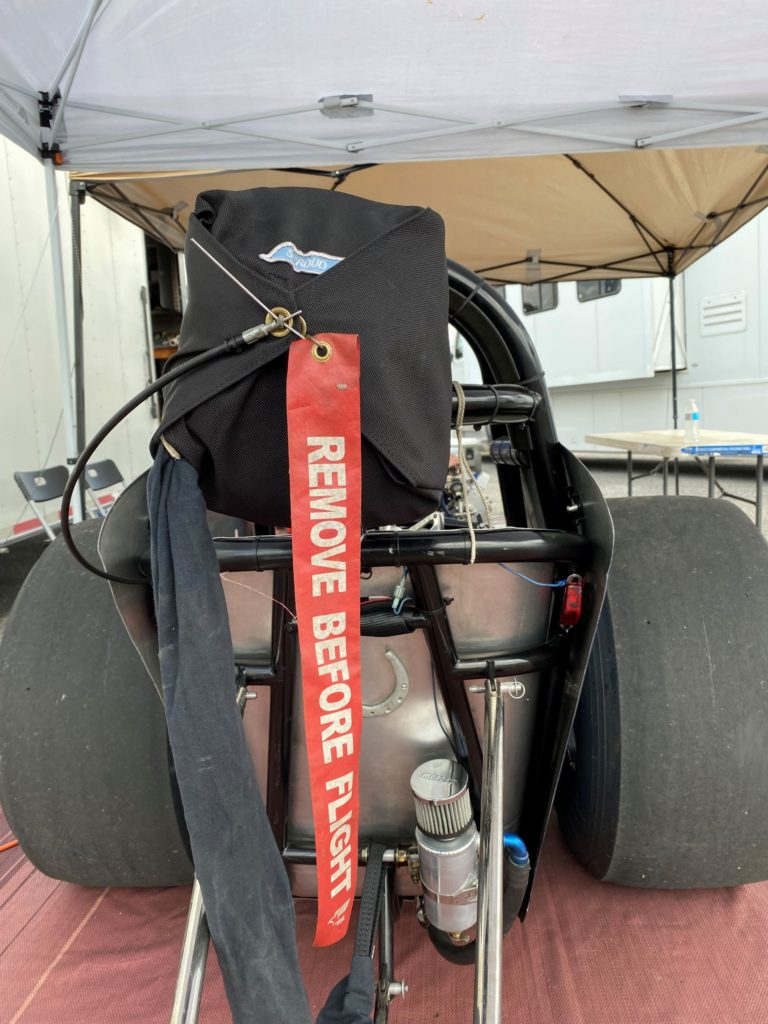How To Create Emotional Safety in Your Relationship
My husband is a championship-level professional drag racer and licensed in three classes. Here’s a picture of his current ride, a Nostalgia Front Engine “slingshot” Dragster.

These race cars push three and a half g’s when they leave the starting line, and push him hard into the seat! They’re so fast that he needs a parachute to stop them. When the parachute blossoms, it causes three and a half g’s and throws his body forward. This force is one reason why very tight seatbelts are necessary.

The Science of Parachutes
Just like you feel resistance when walking through a pool filled with water, a similar effect can be felt through the air. The car is aerodynamically designed to reduce drag so it can push through the air as quickly as possible. The goal is to reduce drag until the finish line, then create drag to slow down the vehicle using a parachute. Remember when I said the car pushes two g’s off the starting line? It does the opposite when the driver pulls the chute; it causes two negative g’s!
Here’s a fascinating and understandable explanation from race car driver Courtney Force of how a drag racer feels when they experience positive and negative g’s.
Crazy, huh? But, you might be wondering what this has to do with marriage and relationships. Hey, I’m getting there, OK?
The parachutes keep my husband safe. I pack the parachutes. So, in essence, I keep him safe. Keeping him safe is my most important role on the team. It’s also my job as his partner. These parachutes symbolize how we create emotional safety for each other every day. You may not pack parachutes for your spouse, but your job is to do the same.
Emotional safety is the foundation of all healthy and meaningful relationships. But, what is it?
But first, here’s what it’s not.
Emotional safety is not present in an abusive relationship. If you’re not safe physically or emotionally, you have several options for seeking help. Try contacting a trusted friend, family member, or therapist or calling a domestic violence hotline.
Emotional Safety
Emotional safety is a state where we are open, vulnerable, and intimate with each other. It is the foundation where connection flourishes.
We’re wired with the desire to feel safe, and we try to protect ourselves from perceived danger by going into fight-or-flight mode.
On the other hand, when you are in an emotionally safe relationship, you trust and relax with each other. Thus, you feel safe and to let down your guard, be completely yourself, and share what’s on your heart without worrying about being judged or criticized for them. You have freedom to be creative, share bold thoughts and ideas, express compassion, and communicate your hurts, fears, and deepest longings.
My Tips on How To Create Emotional Safety in Your Relationship
Inquire instead of accuse.
It’s easy to assume we know what our partner is thinking, but often we miss the mark. Inquiring comes from openness and curiosity, while accusing comes from assumptions and judgment.
When we inquire, we send the message that we seek to connect through understanding, while when we accuse, we send the message that we know best which generally results in misunderstanding and disconnection.
The more we inquire instead of accuse, the more likely our partner will feel that it’s safe to open up to us.
Avoid absolute language.
Couples commonly use absolute language when they’re upset.
Here are some examples:
“You never buy me flowers.”
“You never listen.”
“You always criticize me.”
Absolute language is often inaccurate and denies the nuances of being human. In relationships, absolute language is unproductive because it tends to put us on the defensive.
If you say, “You never buy me flowers,” your partner will likely quickly respond defensively, “I bought you flowers for our anniversary last year!” Not only does this escalate the conflict, but it doesn’t resolve the initial complaint that she would like to receive flowers more often.
Consider this reframe: “I loved the flowers you gave me for our anniversary last year. It’d mean a lot to me if you’d do that more often.”
It starts with a compliment to gain buy-in from the partner and then clearly sets out the request.
Some couples are reluctant to be this straightforward because it requires vulnerability to ask for something they want and risk not getting it.
But when both partners work to give this kind of direct feedback, they’re acknowledging that it’s safe to express their wants and needs in the relationship, which enhances the couple’s connection.
Listen to understand, not to convince.
Couples often fall into the relationship trap of trying to convince the other that their way of thinking is correct, leading to disconnection in the relationship and feeling unsafe to share their thoughts.
Instead, when we listen to understand our partner’s perspective, we allow ourselves to become open to the possibility of new ideas and increase our connection with our partners by enabling them to feel heard and understood.
I hope these tips help you to create a sanctuary within your relationship with one another. It’s much needed today more than ever. If you find yourself in the need of more peace right now, here’s some additional advice.
I wish you peace and love in these days, Friend.


